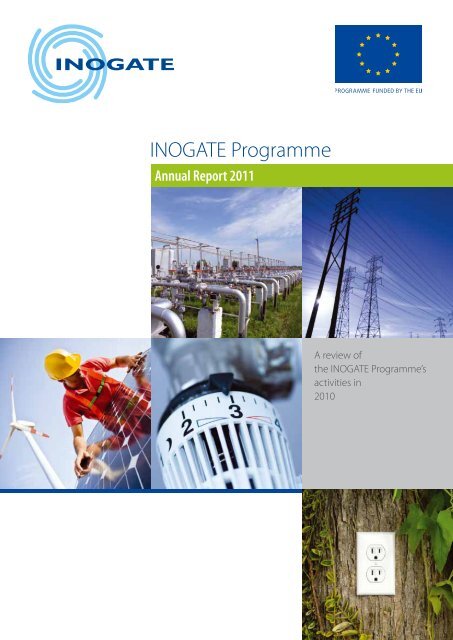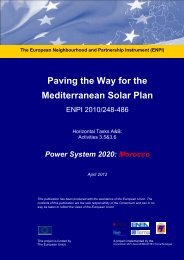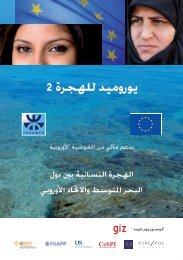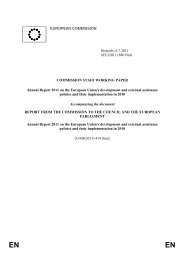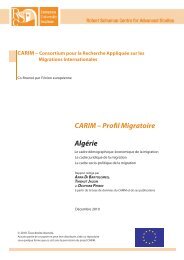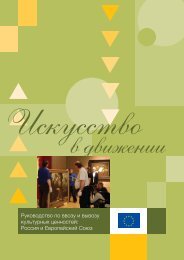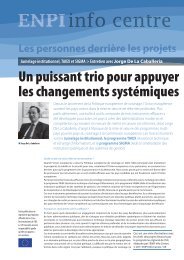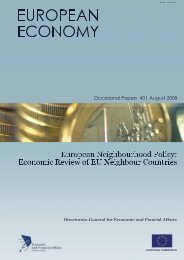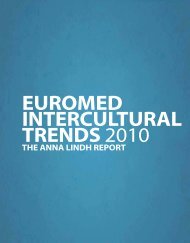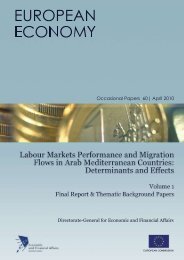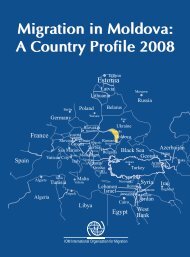Download - EU Neighbourhood Info Centre
Download - EU Neighbourhood Info Centre
Download - EU Neighbourhood Info Centre
- No tags were found...
Create successful ePaper yourself
Turn your PDF publications into a flip-book with our unique Google optimized e-Paper software.
INOGATE Dialogue and CooperationINOGATE was created in the 1990s principally to support energy infrastructure and development in the countries of the former SovietUnion. Although initially mainly concerned with oil and gas pipelines, all the participating countries agreed that a closer cooperation onwider energy issues would be in their mutual interests.INOGATE is grounded in energy dialogue between the <strong>EU</strong> and its Partner Countries. The INOGATE Partner Countries are Armenia,Azerbaijan, Belarus, Georgia, Kazakhstan, Kyrgyzstan, Moldova, Tajikistan, Turkey, Turkmenistan, Ukraine and Uzbekistan.This dialogue was embodied in the decisions agreed at two Ministerial Conferences; in Baku in 2004, when the ‘Baku Initiative’ identifiedfour priority areas for energy policy cooperation, and in Astana in 2006 when the Partner Countries agreed an energy ‘Road Map’ setting outthe path towards achieving the objectives of each priority area. These four priority areas – energy market convergence, enhancing energysecurity, sustainable energy development and investment attraction - have formed the essence of the INOGATE projects financed by the<strong>EU</strong> in the Partner Countries, as can be seen in the present report.INOGATE Meeting of Country Coordinators and Working Group Members in Brussels 2010A further crucial perspective for INOGATE’s activities came with the creation of the <strong>EU</strong>’s Eastern Partnership launched in May 2009, whichinvolves INOGATE’s East European and Caucasus members, and to which €600m. of funding is dedicated in the period 2010-13. The Partnership’ssix Flagship Initiatives include two on energy, ‘Regional energy markets and energy efficiency’ and ‘Diversification of energy supply’,both of which are reflected in INOGATE’s priorities.However, the key to INOGATE’s success has been its commitment to a ‘demand-driven’ approach sensitive to Partner Countries’ needs, ratherthan to rigid programming. At the heart of INOGATE is its network of expert associates in the Partner Countries, who provide vital input toINOGATE’s evolution.Each member state has an INOGATE Country Coordinator, who has an overview of local INOGATE actions, and maintains regular contactboth with the INOGATE Technical Secretariat (ITS), located in Kiev, and with local stakeholders. Each of the priority areas of INOGATE isassociated with a standing Working Group to which each country nominates an appropriate expert. Country Coordinators are also closelyin touch with their country’s Working Group Members.At the regular Country Coordinator meetings and Working Group meetings these experts are able to share ideas and comments onINOGATE’s progress with each other and with representatives of the European Commission. This information network keeps INOGATE aliveto the rapidly changing economic, political and energy trends of the modern world and enables it to develop its focus in the best interestsof all its participants.The Commission’s ‘Concept Note on the New INOGATE Programme’ issued in December 2010 (and available on the INOGATE web portalwww.inogate.org), recognises the inherent strengths of the INOGATE dialogue and cooperation, and its proposals to build on these willensure that INOGATE continues to have a crucial role in regional energy capacity-building, energy policy, sustainable development andinvestment.This Annual Report summarizes our achievements during the 2010 and gives insight into the progress and results of INOGATE projectscarried out in Partner Countries under each of the four priority areas of INOGATE cooperation.INOGATE Programme | Annual Report | 2011 | 5
INOGATE Achievements in 2010During 2010 INOGATE projects…. . . c a r r i e d o u t 6 0 e v e n t s• 34 training events (workshops and seminars) involving over 600 participants;• 11 information events informing stakeholders of INOGATE actions and support potential;• 5 regional conferences/technical group meetings cooperating with stakeholders in technicalissues supporting the INOGATE objectives;• 4 study tours/exchange programmes enabling key Partner Country experts to experience <strong>EU</strong>energy techniques and policies at first-hand;• 2 Country Coordinator/Working Group Member conferences enabling the key membersof the INOGATE Network to meet with each other and with representatives of the European Commissionto review and develop the INOGATE Programme;• 4 Project Launch/Closing Conferences introducing new INOGATE projects or communicatingkey lessons learned and achievements of completed projects.Each event was supported by extensive documentation which can be found on the INOGATE webportal.. . . i s s u e d 2 4 p u b l i c at i o n s• including four issues of the INOGATE newsletter, technical reports, investment guides, projectbrochures, and handbooks. Most of these publications can be accessed from the INOGATE webportal.6 | INOGATE Programme | Annual Report | 2011
. . . l a u n c h e d 4 w e b s i t e sThe INOGATE web portal was totally rebuilt with increased information and a more user-friendlyinterface at http://www.inogate.orgFrom the INOGATE web portal project pages you can also access the websites of:• the project ‘Enhancement of Environmental Protection Measures in the Oil/Gas Industries ofCentral Asia’ (EPMOGI);• the project ‘Support to Kyoto Protocol Implementation’ (SKPI);• the project ‘Harmonisation of gas and oil technical standards and practices in Eastern Europeand the Caucasus’.. . . u n d e r ta k e n a va r i e t y o f t e c h n i c a l s u p p o r tincluding:• Supply of €2m. of equipment to Central Asian partner countries by the EPMOGI project;• Launch of the Ad Hoc Expert Facility and Project Preparation Facility by the SEMISEproject, resulting in over 50 applications for targeted technical assistance.INOGATE Programme | Annual Report | 2011 | 7
p r i o r i t y A r e aConvergence of energy markets1During 2010, the INOGATE Programme focused on three principal issues in energy market convergence:• transfer of know-how on standardisation of technical energy standards;• capacity building for energy regulators;• raising awareness of the <strong>EU</strong> Acquis in energy policies.Significant progress has been made in respect of harmonisation of standardsfor the oil, gas and electricity industries. By working with national standardisationbodies, support has been given to the establishment of technical committeescovering groups of Partner Countries. These have been able to developharmonisation strategies and guidelines for the adoption of regulations, enhancing theprospect of agreements on shared standards among all INOGATE Partner Countries.Harmonisation of Electricity Standards project,1st Coordination Meeting, Kiev, Ukraine, 26 April 2010At the same time cooperation has been established between European standardisationorganisations and the Partner Countries standardisation bodies for furthertransfer of know-how and technical support. These sustainable outcomes argue wellfor ongoing harmonisation processes beyond individual project horizons.“In general, everything that INOGATE does is important for our country. In 2010, Moldova became a full-fledged member ofthe European Energy Community. A large-scale programme of accession to the Union for the Co-ordination of Transmission ofElectricity (UCTE) is ahead of us. And there are a lot of important actions coming up, which will help us, to fulfil the commitmentsunder the European Community. These are the areas in which the INOGATE Programme has assisted us and, I hope, will continueto assist us.”Galina Parsian, INOGATE Country Coordinator, Republic of MoldovaHead of the Thermal Power Department, Ministry of Economy of the Republic of MoldovaOver 100 European and international standards have been translated into Russianfor easy reference by the Partner Countries. The INOGATE projects active in this areain 2010 were Harmonisation of technical standards, rules and practices in theelectricity sector in NIS countries, and Harmonisation of gas and oil technicalstandards and practices in Eastern Europe and the Caucasus.Innovative work with energy regulators in two capacity-building projects,involving all INOGATE member countries, has been carried out by ERRA (the EnergyRegulators Regional Association). The activities of these projects included a peer-reviewprocess whereby regulators and ministry officials from participating countries contrastERRA Training Course: Renewable Energy Regulation,Minsk, Belarus, 13 -15 September 2010and compare colleagues’ practices and procedures with their own, which has beenthe source of constructive new thinking and debate. Such benchmarking of goodpractice has supported information exchange and specialist training, where the experience of <strong>EU</strong> countries has been shared.A special emphasis has been given in 2010 to regulatory issues associated with sustainable energy, tying in closely with the objectivesof Priority Area no. 3 (Sustainable energy development). These actions have contributed substantially to the work of Partner Countriesin carrying out their regulatory reforms and improving their regulatory responsibilities and efficiency, bringing their market regulationacquis closer to that of the <strong>EU</strong>.8 | INOGATE Programme | Annual Report | 2011
“Georgia gained a lot from the INOGATE Programme. Regulators have been involved in the INOGATE Programme for the last4 years. We gained substantial knowledge, experience and expertise. We attended meetings, and training regarding energyregulation, <strong>EU</strong> directives, and renewable energy, including financing for renewables. This has all been very useful for us as wegained new information and we saw the way, which we should take in order to become closer to the Europe. INOGATE opened forus opportunities to know where are we going, how should we transpose <strong>EU</strong> directives into Georgian legislation, what steps shouldbe taken in order to be closer to Europe, and to be part of the <strong>EU</strong> energy market, which will be very beneficial for Georgia as acountry. So, if we compare ourselves when we attended the first meeting of the INOGATE and today, we have a huge difference interms of our experience, our knowledge and our motivation.”Irma Kavtaradze, Permanent INOGATE Regulatory Representative, GeorgiaCommissioner, Georgian National Electricity Regulatory CommissionTargeted direct support actions under the INOGATESupport to Energy Market Integration and SustainableEnergy (SEMISE) project have advanceda number of regional initiatives for market convergenceto key energy stakeholders in the PartnerCountries. The project’s unique demand-drivenstructure, delivering support through its Ad-HocExpert Facility and Project Preparation facility, hasenabled it to tailor its activities to meet the specificneeds and suit the differing policy levels of INOGATEPartner Countries.ERRA: Workshop on Regulatory Implications of District Heating:Kiev, Ukraine, 2-3 December 2010During 2010, SEMISE provided technical support through a number of assignmentsin this priority area:• regulators and state bodies from Azerbaijan, Belarus and Moldova have beenassisted in the preparation of feed-in tariffs for energy generated by renewableprocesses;• recommendations on pricing of ancillary services and support for the preparationof a methodology for treatment of technical losses in the electricity network havebeen made to ‘Ukrenergo’, the national power company of Ukraine; and• support has been provided to AO ‘Moldovagaz’ on improving gas paymentcollection rates.SEMISE, Training course on Energy Market Convergence,Baku, 28 June - 1 July 2010In addition the project carried out a training course on ‘Energy Market Convergence’ in Baku, Azerbaijan, from 28 June-1 July 2010, whichwas followed by a study tour to Latvia on 4-7 October 2010.“An example of this successful cooperation in the development of our specialists [under INOGATE] is the implementation of projectsof Harmonization of oil and gas sector standards and Harmonization of electricity standards, and the project for Energy regulation.”Aleksei Voystrikov, INOGATE Country Coordinator, Republic of BelarusDeputy Director, OJSC “Economenergo”INOGATE Programme | Annual Report | 2011 | 9
p r i o r i t y A r e aEnhancing energy security2The year 2010 saw the successful completion of the INOGATE project on Safety and Security of Main Gas Transit Infrastructuresin East Europe and the Caucasus. The project laid down guidelines for establishment of the Pipeline Integrity ManagementExcellence System (PIMS) and organised a pilot for this process in Ukraine.This safety management system covers all the key functions of pipeline management, including the establishment of procedures,hazard identification, operations, monitoring and diagnostics, mitigation (preventive and corrective actions), emergencyresponse, training, communication, and review. The PIMS IT system, including comprehensive hardware and software, is nowinstalled at the main Control <strong>Centre</strong> of the recipient in Kiev, and full training has been given. This has included work with keybeneficiary personnel on a pipeline segment, and training (including a study tour in the <strong>EU</strong>) on systems adopted in PartnerCountries and abroad.Brochure for the Boyarka <strong>Centre</strong>, produced by the INOGATE project ’Feasibility studies for expanding the Boyarka Gas Metrology <strong>Centre</strong>’.At the Boyarka Metrology <strong>Centre</strong> in Ukraine INOGATE has supported significant review and expansion of the <strong>Centre</strong>’s activities.This has included an equipment review and the provision of an investment of €1,000,000 in supply of additional technology.Training has included work on gas flow metrology and calibration of a wide variety of equipment (covering gas pressure, gastemperature, gas flow, gas composition, gas humidity, and gas density). It has also comprised work on developing a QualityManagement System to standard ISO 17025, covering the <strong>Centre</strong>’s activities.Building on previous work at the <strong>Centre</strong>, the preparation has now commenced on a wide-scale business plan for commercialisationof the <strong>Centre</strong>, to allow it to reach its full potential. This process covers not only marketing and promotion of the centre(including literature and the launch of a website for the centre), but extensive additional training and feasibility studies, presentlyunder way.10 | INOGATE Programme | Annual Report | 2011
“The INOGATE Programme gave an impulse to further develop the electricity sector of the Republic of Tajikistan in the area ofstandardization and harmonization of secure electric supply. The Republic of Tajikistan is a mountainous country with 93% ofits territory is covered by mountains. The most developed sector is hydropower. With the help of the INOGATE Programme, wepurchased a laboratory and equipment, which can be used to reduce gas losses and ensure a more secure supply of gas to ourpopulation. It is very important for us, as our Republic needs to decrease losses in the gas sector because we buy gas from neighboringcountries.”Nurmahmad Holnazarov, INOGATE Country Coordinator, Republic of TajikistanHead of the Department for Electroenergetics, Ministry of Energy and Industry of the Republic of TajikistanAnalysis of best <strong>EU</strong> practices in hydrocarbons metrology,optimisation of transit flows, leakage monitoring and trainingprocedures, has been combined with in-depth analysesof lay-out and extension potential at the Boyarka site, reviewand definition of technical equipment requirements,identification of training facilities and a full environmentalimpact assessment of extension of the <strong>Centre</strong>’s activities.All these have fed into development of the comprehensiveplan which will result in Boyarka becoming a leading internationalmetrology technical and training centre. Mr. VitaliyPogoriliy, First Deputy Director of the Boyarka Metrological<strong>Centre</strong>, complimented INOGATE’s work at Boyarka as ‘dynamic’.EPMOGI study tour for gas sector senior managers from the beneficiary gas companiesof Central Asia to the Netherlands and Belgium, 11-17 July 2010In Central Asia the project ‘Enhancement of EnvironmentalProtection Measures in the Oil/Gas Industries ofCentral Asia’ (EPMOGI) undertook a number of energy–security related initiatives, including a Study Tour for gas specialists andengineers to the Netherlands and Belgium to gain ‘hands-on’ experience of the Pipeline Integrity Management System and of<strong>EU</strong> practices.Views from the Boyarka Metrological Station in UkraineINOGATE Programme | Annual Report | 2011 | 11
p r i o r i t y A r e aSustainable energy development3Issues of sustainable energy and energy efficiency have been given increasing attention by theINOGATE Programme. INOGATE actions have ranged from policy work with governments on climatechange strategy and the Kyoto protocols, through work with energy companies, governments andNGOs on environmental protection, to direct work with small and medium enterprises.The launch in January of the INOGATE project ‘Energy Saving Initiative in the Building Sector’ (ESIB),covering all Partner Countries, and the official launch in February of the INOGATE-supported EBRDMoldovan Sustainable Energy Financing Facility (MoSEFF), together with the accomplishment of theproject ‘Enhancement of Environmental Protection Measures in the Oil/Gas Industries of Central Asia’ (EPMOGI), which held its FinalConference in December, were landmarks in the development of this area of cooperation.A significant action during 2010 was INOGATE’s supportin organising the International Conference in Tbilisi on21-22 October, ‘Covenant of Mayors Going East’. TheCovenant of Mayors is a European Initiative involving localand regional authorities, voluntarily committing to increasingenergy efficiency and the use of renewable energysources on their territories. Through this important event,attended by over 150 people from over 45 cities of theEastern Europe, Caucasus and Central Asia region, citiesfrom the region gave a strong signal that they want to takean active role in addressing the growing energy concernsthat directly affect the lives of their citizens. Tbilisi, the firstcapital city of the <strong>EU</strong>’s Eastern <strong>Neighbourhood</strong> countries to‘Family portrait’ at the ‘Covenant of Mayors Going East’ conference launch, Tbilisi,sign the Covenant of Mayors, hosted the International Conferencewhich attracted extensive media coverage and her-Georgia, October 2010alded a significant boost to the expansion of the Covenant throughout the INOGATE Partner Countries. Encouraging the participation fromcities in the INOGATE Partner Countries in the Covenant of Mayors initiative is the objective of a major forthcoming <strong>EU</strong> project.“Today, the priority for the Kyrgyz Republic is the realization of the Law on Renewable Energy Sources and Energy Efficiency.In our country, there’s a lot of sunlight, and we consider it necessary to use its potential. However, currently the Kyrgyz Republiconly uses hydro-energy as a renewable energy source to produce electricity. In the co-operation field of ‘Sustainable energy’, theINOGATE Programme provides us with significant assistance to realize this objective.”Gulsara Kasymova, INOGATE Country Coordinator, Kyrgyz RepublicHead of Gas and Heat Supplies Section of the Fuel and Energy Complex Department, Ministry of Energy of Kyrgyz RepublicThe principles and mechanisms of the Kyoto Protocol were given a significant boost throughout the Partner Countries by the project‘Support to Kyoto Protocol Implementation’ (SKPI), which issued a number of publications on key issues. These included a bilingualprimer on the Kyoto Protocol, (with a specific legal primer on issuing and trading Emission Certificates under the Protocol); a CarbonFootprint assessment tool; templates for national climate change action plans; and negotiation summaries and briefs following theCopenhagen Climate Conference. Training was given on the Protocol’s flexible mechanisms, on regional adaptation, and on preparationfor the ‘post-2012’ agreement which is scheduled to replace the Kyoto Protocol itself; practical advice was given on financing foradaptation to meet the Protocol objectives. The project worked with Partner Country Governments in preparing national climatechange action plans and in evaluating comparative energy efficiency indicators. It also produced relevant video educational materials.In Central Asia the EPMOGI project undertook a number of other initiatives, including the implementation in Kyrgyzstan of a CleanDevelopment Mechanism (CDM) project under the Kyoto Protocol, on reduction of natural gas emissions and leakages in pipelines andcompressor stations.12 | INOGATE Programme | Annual Report | 2011
“ESIB is a very interesting project that covers a number of issues in which Armenia is interested. Most of the buildings in Armeniahave thin walls, and because of this we suffer great losses. The INOGATE Programme has helped us to deal with this problem.Thanks to INOGATE, we started to implement the process of labeling of electric and gas-consuming devices. As the experience ofother countries showed, especially the experience of Eastern European countries, it is a very effective method. It is a very goodexample of energy saving for our country.”Hrachik Tsughunyan, Representative of INOGATE Working Group 1“Harmonisation of Legal, Regulatory and Institutional Framework” for the Republic of ArmeniaHead of Energy Saving and Technical Standards Division, Ministry of Energy and Natural Resources of the Republic of ArmeniaIn the field of environmental improvement and sustainability, theEPMOGI project organised seminars throughout Central Asia ontopics including <strong>EU</strong> environmental legislation, oil and gas industryenvironmental protection requirements, use of alternative clean fuels,and environmental management systems. Specific workshops wereconducted in Kazakhstan and Kyrgyzstan on the environmentallegislation of those countries. All these actions were well attended bypartner country key stakeholders in government and industry.Moreover the project took a leading part in a number of high-profileconferences in the region, making presentations at the AtyrauLegal Conference, the conference ‘Oil and Gas Uzbekistan’ and theconference ‘Oil and Gas Turkmenistan’. Senior environmental andSEMISE, Study Tour of Latvian electricity and gas companies,energy government officials working in the oil sector took part in a 4-7 October 2010study tour to Britain to learn of environmental protection measures inrespect of offshore drilling and oil spill. The project carried out preliminary assessment of environmental implications of offshore drillingin the Caspian Sea. The project produced significant documentation which is available on the INOGATE web portal. Furthermore,all 5 Central Asian countries have received specialised equipment, the major part of which is dedicated to the detection, analysisand elimination of leakages from national gas transportation systems. Specifically, all beneficiary countries received 4WD vehicleswith installed laser methane detectors, various types of methane detectors and gas analysers, and gas flow / leak volume meters.“We have done a lot since the times of “Baku Initiative” and agreement of the Astana Road Map; we have achieved results. Forexample, last year the INOGATE Project “Enhancement of environmental protection measures in the gas/oil industry of CentralAsia” was finalized. The project provided important recommendations to the National Plan of reaction to oil spill. I hope that infuture our joint work will be strengthened. We will try hard to participate actively in the INOGATE Programme in order to achievegood results.”Asel Syzdykova, NOGATE Country Coordinator, Republic of KazakhstanHead of Section of Department of Strategic Development and International Cooperation, Ministry of Oil and Gas of the Republic of KazakhstanINOGATE work with partner country regulators has included training on regulatory impact on renewable energy, and on internationalexperience of the development of secondary legislation concerning renewable energy. Attention has been paid to improving energyefficiency in district heating schemes, a major issue for all partner countries. The work of the ESIB project has featured training onbuilding construction to high energy efficiency standards, and on energy performance labelling.Meanwhile support provided to Partner Countries in this field by the SEMISE project has covered two areas, both institutional andtechnical. As regards the first, the project has undertaken capacity building on energy efficiency and renewable energy for staffof ministries and agencies in Georgia and Kazakhstan, and, support to governments on development of relevant primary andsecondary legislation in Azerbaijan, Belarus, and Moldova. Work has also been undertaken on greenhouse gas emission assessment andmitigation for ministries and for local government in Belarus. In addition the project supported applications to join the Covenant ofMayors from towns in Armenia, Azerbaijan and Georgia. On the technical side, attention has been paid to providing advice on technicalaudit methodologies for small hydroelectric power plants.INOGATE Programme | Annual Report | 2011 | 13
p r i o r i t y A r e aAttracting investment4Investment activities by INOGATE during 2010 have focused on thedevelopment of the Moldovan Sustainable Energy FinancingFacility - MoSEFF and Ukraine Energy Efficiency Programme 2 -UKEEP2 under the project ‘Identification and Promotion of EnergyEfficiency Investments’.The SEMISE project has also been involved in the essential task of capacity-building oflocal financial institutions to support energy-efficient projects in INOGATE Partner Countries.This support of culture-change in financial institutions is essential to address understandingby such institutions of the need for investment to address the special needs ofenergy efficiency – investment addressed to cutting costs, as opposed to typical investmentapplications addressed to expanding production.Both MoSEFF and UKEEP2 are oriented, on the other hand, to small and medium sizebusinesses seeking such investment support.MoSEFF as formally launched on 11 February 2010, and is intended to finance almost 200 projects using financing of €20m supportingenergy efficiency investments in Moldovan enterprises. Incentives and technical assistance provision for applicants willtotal over €6m. MoSEFF aims at energy savings of 22,000 MWh/year and CO 2emission reductions equivalent to 6,600 tonnes. Thefund’s own website went on line during the year at www.moseff.org. The financing is bound to investments fostering sustainableenergy saving and production of renewable energy. To make energy efficiency and renewable energy investments even moreattractive, MoSEFF offers grants for eligible projects. Depending on the energy savings and CO 2emission reductions of a project,the grant may reach between 5% and 20% of the loan amount. The main aim of these grants is to make a sound project economicallyviable and feasible for implementation. Another aim is to foster the application of advanced technologies in Moldova.This is achieved by offering higher grants for projects that employ best available technology.“I would say INOGATE definitely facilitated investments into the region. A concrete example is the Moldovan credit line, where theEBRD provided <strong>EU</strong>R 20 million for on-lending to Moldovan companies through local partner banks to invest in energy efficiencyand renewable energy projects. This would not have been possible without the technical assistance package we used. Thanks toINOGATE’s support through both technical assistance and incentive payments, we have been able to assist many companies toimprove their business by saving energy and increasing their competitiveness.”Fani Kallianou, European Bank for Reconstruction and DevelopmentUKEEP was established to facilitate investments in energy efficiency in Ukraine. UKEEP2 has a fund of €100m., with technicalassistance available to applicants of €3.25m. Its target is to fund over 500 projects, which will also result in substantial energysavings and reduction of CO2 emissions. UKEEP provides free technical assistance by international energy efficiency experts forcompanies with project ideas that are eligible for UKEEP financing. Local financial institutions to work within UKEEP2 have now14 | INOGATE Programme | Annual Report | 2011
The INOGATE Technical SecretariatThe INOGATE project “Strengthening of the INOGATE Technical Secretariat in Support of the Baku Initiative” covers all theINOGATE priority areas.Coordinating INOGATEThe INOGATE Technical Secretariat (ITS), based in Kiev, and witha Caucasus Regional Coordination Office in Tbilisi, acts as acoordinator for the actions of the “Baku Initiative” and theINOGATE Programme. In pursuit of the objective of improvementof coordination of the INOGATE Programme, the ITS preparedthe integrated bi-annual INOGATE Work Programme 2010-2011which was presented and agreed by the Country Coordinators,Working Group members and the representatives from EnergyRegulatory Authorities at the meeting in Brussels on 18-19May 2010. The updated version of the Work Programme 2010-2011 was validated by the Country Coordinators during themeeting organised in Tbilisi on 20 October 2010.As part of its role to expand the coordination network, and as some of the Partner Countries of the INOGATE Programme were observersor had acceded to the Energy Community Treaty, the ITS established a closer partnership with the Energy Community Secretariat.On 8 September 2010 a coordination meeting was organised in Vienna with the aim of exchanging experiences and approachesbetween the Secretariats. Furthermore, an agreement was reached on the coordination of activities and participation inevents.Family Photo at the INOGATE Meeting of Country Coordinators and Working Group Members in Brussels 201116 | INOGATE Programme | Annual Report | 2011
Communicating INOGATEINOGATE is committed to spreading the ideas and actions of INOGATE to both stakeholders and civil society in the INOGATE PartnerCountries and the <strong>EU</strong>. Thus 2010 has seen a continuing accent on highlighting the real difference that INOGATE actions can make – theINOGATE communication initiative includes this Annual Report, the quarterly INOGATE Newsletters, the new upgraded INOGATE WebPortal at www.inogate.org, which was re-launched in its updated format in December 2010, and a series of events.The new portal is thoroughly redesigned and enables swifter response and searching, enhancing access to INOGATE’s substantial andunique database on energy actions in the partner countries, including INOGATE projects of earlier years. <strong>Info</strong>rmation on all INOGATEprojects (past and present), together with much downloadable information on their activities, can be found on the INOGATE web portal.It further includes background information on each Partner Country’s energy background and on <strong>EU</strong> energy policy and acquis.In its role as major communicator of the INOGATE Programme as a whole, and with the aim of promoting INOGATE Activities, the ITSparticipated in various energy events, opening meetings, workshops, and closing conferences organised by other INOGATE projects aswell as in the International Conference ‘Covenant of Mayors Going East’ in Tbilisi on 21st-22nd October 2010 which was organizedby the SEMISE project.It also participated in the 1st European-Ukrainian Energy Day held in Kiev on 31 May – 1 June, the 14th ’Oil and Gas Forum‘ exhibitionand conference in Kiev on 2-4 November 2010, and the ’Turkmenistan International Oil & Gas Conference and Exhibition‘ on17-19 November 2010, with the support of the EPMOGI project.In the course of 2010, the INOGATE Technical Secretariat organized three INOGATE local <strong>Info</strong>rmation events in association withthe relevant energy ministries in Ukraine (7 October 2010), Tajikistan (13 April 2010) and Turkmenistan (22 November 2010) tohighlight INOGATE actions and potential in each country, reaching key energy stakeholders and attracting media attention. Further, aCommunication Workshop was organised in Tbilisi on 19 October 2010 for Country Coordinators, to develop their capacity in communicatingthe INOGATE programme.INOGATE Programme | Annual Report | 2011 | 17
Overview of the INOGATE Programme’s projects in 2010No AP Project Title Budget Project Duration Area of cooperation1 20052 20063 20074 2008Harmonisation of gas and oil technical standards andpracticesHarmonisation of technical standards, rules andpractices in the electricity sector in NIS countriesCapacity-building for Energy Regulators in EasternEurope and Central AsiaCapacity building for sustainable energy regulationin Eastern Europe and Central Asia€ 2.930.500 12/2007 – 04/2010 Area No.1€ 1.482.500 09/2009 - 03/2011 Area No.1€ 330.000 01/2009 - 07/2010 Area No.1€ 505.856 03/2010 - 09/2011 Area No.15 2005Safety and security of main gas transit infrastructure € 999.990 12/2007 - 03/2010Supply for safety and security of main gas transitinfrastructure in Eastern Europe and the Caucasus€ 738.600 08/2008 - 12/2010Area No.26 20057 20068 2006Validation, certification and subsequent commercialisationof the Eastern Europe Regional <strong>Centre</strong> forHydrocarbons Metrology (Boyarka, Ukraine)Supply of equipment for Eastern Europe Regional<strong>Centre</strong> for Gas Metrology in BoyarkaFeasibility studies for expanding the Boyarka <strong>Centre</strong>to include oil, oil products, liquefied gas metrology,satellite monitoring for optimization and control ofhydrocarbons transit flows & to offer training facilities€ 999.990 07/2008 - 03/2011 Area No.2€ 1000.000 07/2009 - 07/2010 Area No.2€ 1.500.000 08/2009 - 07/2011 Area No.29 2006 Support to Kyoto Protocol Implementation (SKPI) € 4.787.000 09/2008 - 09/2011 Area No.310 2006Enhancement of environmental protection measuresin the oil/gas industry of Central Asia (EPMOGI)Supply of equipment for enhancement ofenvironmental protection measures in the oil/gasindustry in Central Asia - LOT 1, 5€ 2.650.000 12/2008 - 12/2010 Area No.3€ 993.39811 2006Supply of equipment for enhancement ofenvironmental protection measures in the oil/gasindustry in Central Asia - LOT 2, 4, 6€ 961.78012/2009 - 12/2010 Area No.3Supply of equipment for enhancement ofenvironmental protection measures in the oil/gasindustry in Central Asia - LOT 7, 9€ 92.10912 200813 200614 200715 2007Energy Saving Initiative in the Building Sector in theEastern European and Central Asian Countries (ESIB)Identification and Promotion of Energy Efficiency(EE) InvestmentsSupport to Energy Market Integration andSustainable Energy in the NIS (SEMISE)Strengthening of the INOGATE Technical Secretariat(ITS) in support of the Baku Initiative€ 4.449.650 01/2010 - 12/2013 Area No.3€ 9.500.000 12/2006 - 06/2011 Area No.4€ 5.670.000 01/2009 - 01/2012 Areas No.1/3/4€ 2.934.000 02/2009 - 02/2012 Areas No.1/3/416 2008Pre-investment Project for the Trans-Caspian-BlackSea Gas Corridor€ 5.000.000 10/2009 - 09/2012 Areas No.1/3/4Total INOGATE support in 2010 € 47.525.37318 | INOGATE Programme | Annual Report | 2011
ENERGY COOPERATION BETWEEN THE <strong>EU</strong>, THE LITTORAL STATES OF THE BLACK & CASPIAN SEAS AND THEIR NEIGHBOURING COUNTRIES.For the latest information on the INOGATE Programme, please visit http://www.inogate.org


